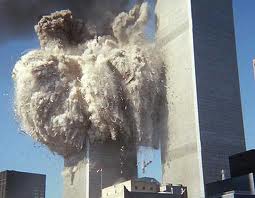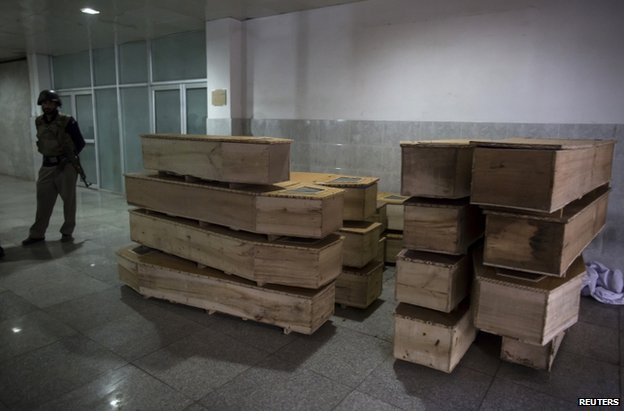I have written before about my respect for Malala Yusufzai, the Pakistani girl shot in the face by the Taliban for simply wishing to have an education. I have also said that courage and vision, of which she has plenty, do not translate into infallibility, and Malala’s campaign for education and against violence, which has won her a Nobel Peace Prize, is based on extremely shaky views. The sad news from her own country today only shows how misguided the pacifist mindset is when it comes to Islamist militants.
Let’s first go over Malala’s views as she sums them up, shared no doubt by many (at least among Western liberals, if not Pakistanis):
- If the money the United States spends on weapons went toward global education change would come. “The best way to fight terrorism,” she said emphatically, “is through education.”
- A drone attack may kill two or three terrorists but it will not kill terrorism. If the drones continue terrorism will spread.
Facts, on the other hand, draw a very different picture. Point 1 is self-contradictory, and point 2 is dead wrong (excuse the pun).
Here is how we know the first point is bullocks:
We can invest all we want in education. But as long as we do not face up to those who made education unsafe for Malala and continue to do so today, it will be all for naught. The evidence, sad as it is, is also conclusive.
Militants from the Pakistani Taliban have attacked an army-run school in Peshawar, killing 141 people, 132 of them children, the military say.
As for the second point “two or three” terrorists killed by drones (in Malala’s words) should be called the understatement of the century. There is ample evidence that the strikes do a good deal more than that:
Over the past year, the al-Qaeda leader fielded e-mails from followers lamenting the toll being taken by CIA drone “explosions” as well as the network’s financial plight, according to U.S. officials who have completed an exhaustive review of the trove of bin Laden files collected at his compound after the May 2 U.S. raid that killed him.
One of bin Laden’s principal correspondents was Atiyah abd al-Rahman, who served as No. 3 in al-Qaeda before bin Laden’s death. A 2010 message from Rahman expressed frustration with the CIA drone campaign, a source of particular concern because many of his predecessors in the third-ranking slot had been killed in strikes by the unmanned aircraft.
“He was saying in the letter that their guys were getting killed faster than they could be replaced,” the U.S. counterterrorism official said.
All told, the 307 drone strikes launched by the United States in Pakistan between June 2004 and June 2012 have killed an estimated 1,562 to 2,377 suspected militants, according to news accounts.
Of those strikes, 70% have struck North Waziristan, home to factions of the Pakistani Taliban and the Haqqani Network, which has often launched operations in Kabul against civilian targets. Over a third of these strikes have reportedly targeted members of the Taliban, with at least 10 of the strikes killing senior Taliban commanders, as well as hundreds of lower-level fighters.
Evidence of the drone strikes’ impact can be found in the description provided by David Rohde, the former New York Times reporter held by the Taliban Haqqani Network for months in 2009, who called the drones “a terrifying presence” in South Waziristan.
Key militant commanders reportedly started sleeping outside under trees to avoid being targeted, while Taliban militants regularly executed suspected “spies” in Waziristan accused of providing information to the United States, suggesting they feared betrayal from within. There were 41 suicide attacks in Pakistan in 2011, down from 49 in 2010 and a record high of 87 in 2009. The 118 drone strikes carried out in 2010 coincided with an almost 50% drop in suicide attacks across Pakistan, according to the Pak Institute for Peace Studies, which monitors Pakistani militant groups. [Emphasis added]
But, of course, Malala and her liberal sympathizers, while downplaying the above facts, focus their attention on the following:
During the summer of 2010 the New America Foundation sponsored one of the few public opinion polls ever to be conducted in Pakistan’s Federally Administered Tribal Areas and found that almost 90% of the respondents opposed U.S. military operations in the region. The wider Pakistani public shares this sentiment: A June 2012 Pew Research Center poll found that about three quarters of Pakistanis consider the drone campaign to be unnecessary.
On the other hand, if these figures are taken to mean that the drone war will backfire and ultimately only foment even more terrorism, there is no reason to think that ground operations against militants will be any different. At least, not as of today:
“The TTP [Pakistani Taliban] is ready for a long, long war against the U.S. puppet state of Pakistan,” a TTP commander told me when I reached him on his Afghan cellphone. “We are just displaced, but we are still in positions to attack wherever we want,” said Jihad Yar Wazir.
Yar Wazir justified the killings as fitting retribution. “The parents of the army school are army soldiers and they are behind the massive killing of our kids and indiscriminate bombing in North and South Waziristan,” which are the TTP strongholds. “To hurt them at their safe haven and homes—such an attack is perfect revenge.”
But the children are innocents, I said. What about them, I asked?
“What about our kids and children,” he said. “These are the kids of the U.S.-backed Pakistani army and they should stop their parents from bombing our families and children.”
Yar Wazir says the TTP (Tehrik-i-Taliban) has a long list of attacks that it will carry out in Pakistan against the security forces, whose efforts to crush the group are supported by the United States. The regions where it is strong have served as a refuge for al Qaeda, which is the main American target.A Peshawar-based journalist, author, and terrorism expert, Aqeel Yousafzai, says today’s attack is a big blow for Pakistan’s counterterrorism strategy and policies. “The army public school was not only for army kids. Most of the kids are civilians’ kids, and what is worse is that the media reached the school before the rapid response force” of the police or military.With Pakistani armed forced as incompetent as they are, and with their operations provoking exactly the kind of response long feared to be brought on by the drone strikes, the demand to stop the drone attacks is tantamount to leaving the militants to carry out their operations undisturbed. Well. We’ve already tried that, and we know where that gets us.

***
Also on Debunking Christianity

